2021 Mazda CX-5 Review: Premium Without the Price
Mazda offers more for less in advance of its move into premium-brand territory.
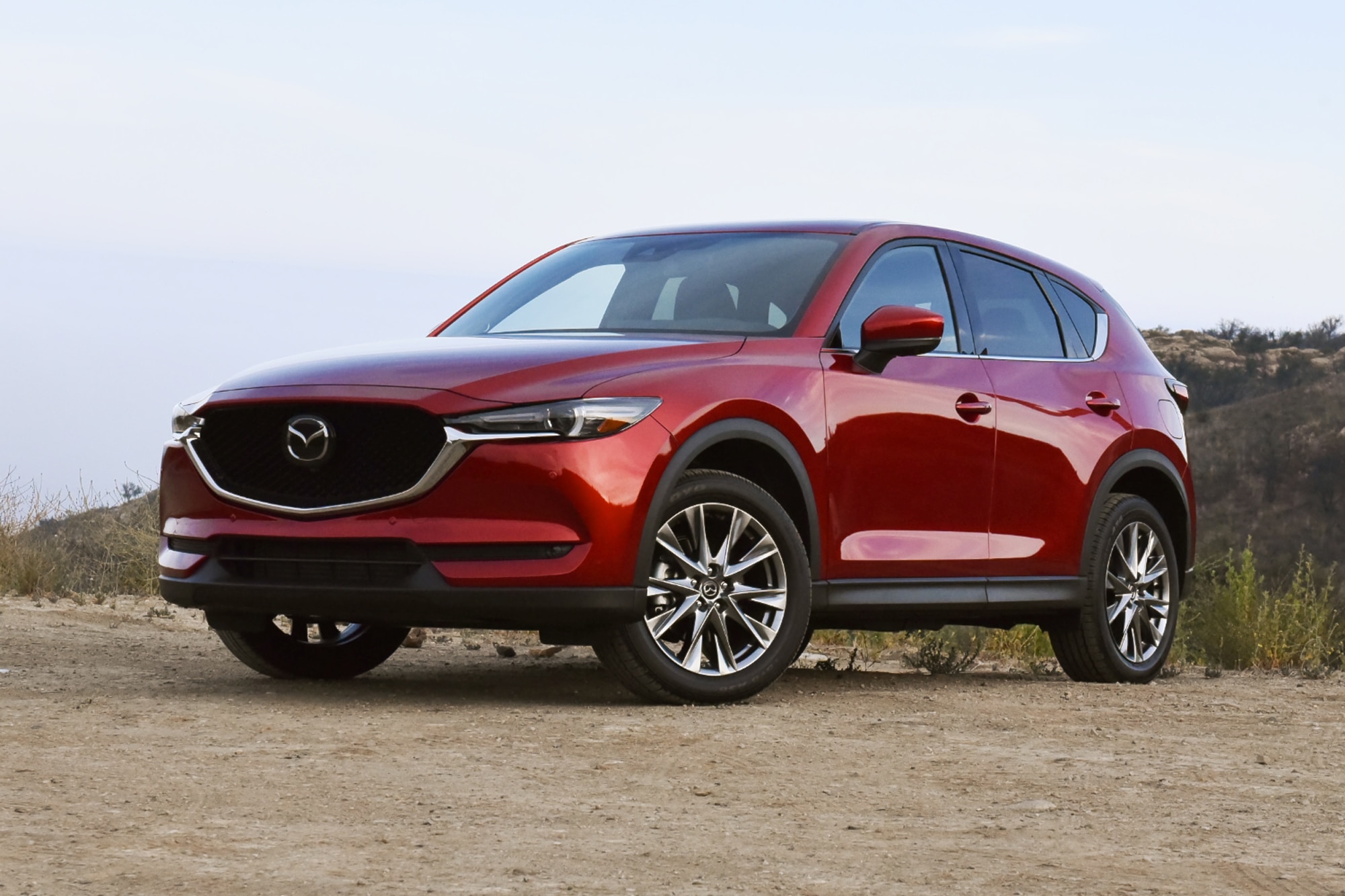 Christian Wardlaw
Christian Wardlaw
The road to prosperity for Mazda travels a path between traditional mainstream and luxury brands. This is known as premium territory: a nebulous region of the automotive market that swaps brand cachet for value. It’s where you get more style, quality, refinement, and performance than you paid for without a badge that socially signals success.
The 2021 Mazda CX-5 reflects this strategy. As a five-passenger compact crossover SUV, the CX-5 is Mazda’s most popular model and competes in one of the most popular vehicle segments with consumers. It is also a vehicle in transition, benefiting from a near-continuous program of improvement since its last 2018 redesign. The Mazda continues to move slowly upscale and can attract customers considering entry-luxury offerings that are often smaller and more cheaply outfitted at a comparable price.
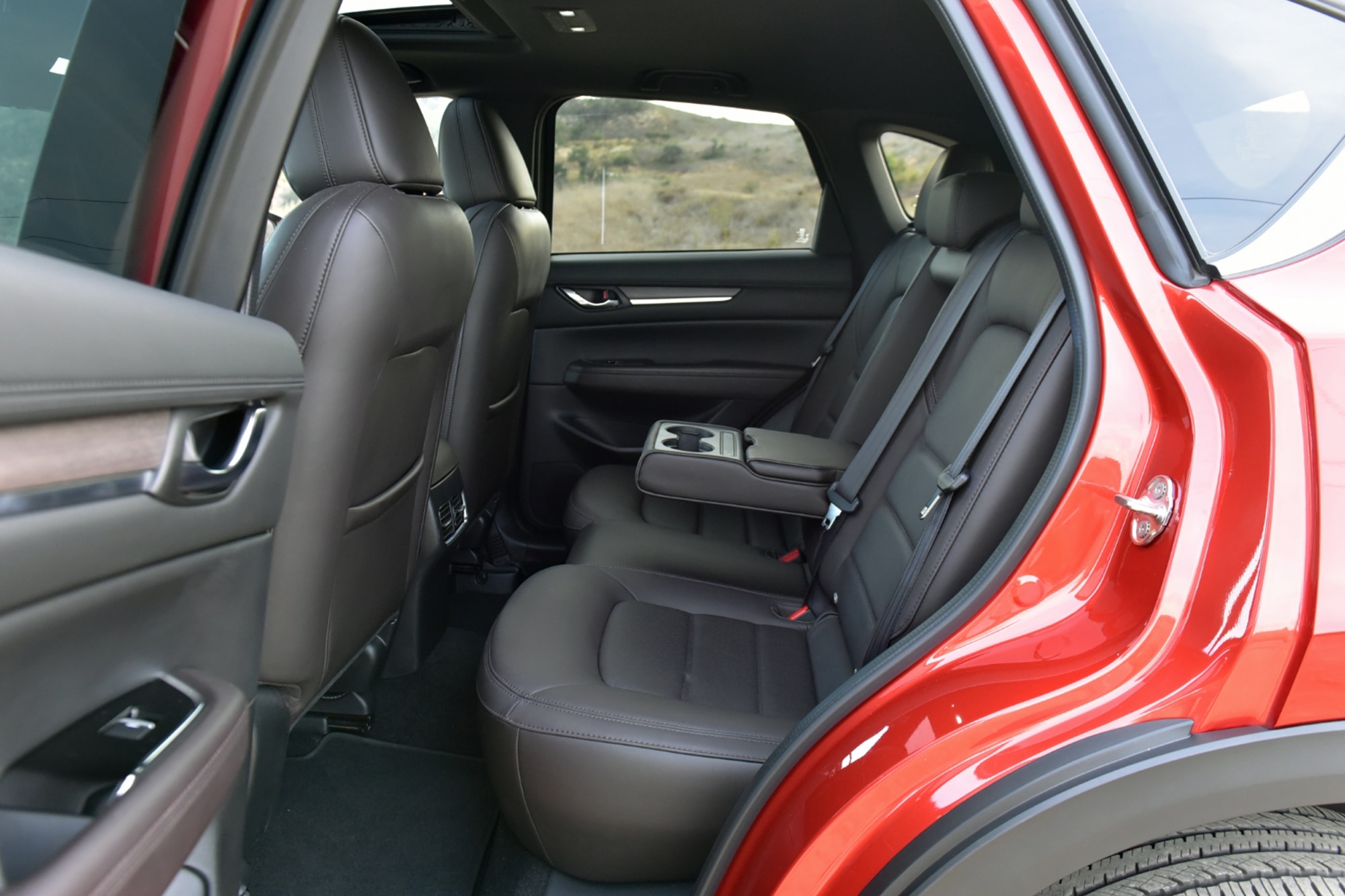 Christian Wardlaw
Christian Wardlaw
This year, the 2021 CX-5 comes in Sport, Touring, Carbon Edition, Grand Touring, Grand Touring Reserve, and Signature trim levels. Prices range from the mid-$20,000s to the high $30,000s. The Carbon Edition is new for 2021, pairing exclusive Polymetal Gray paint with a dark red leather interior and black 19-inch wheels. It is the only trim level offered with both of the CX-5’s engine choices.
Mazda also upgrades the CX-5’s infotainment system to include the company’s latest Mazda Connect platform and new i-ActiveSense safety technologies. A high-value Touring Preferred SV Package is also new for the Touring trim level, equipping the vehicle with leather, a 10-speaker premium sound system, power-adjustable front seats, a sunroof, a power liftgate, and more.
To determine if the automaker’s plan to position itself as a premium brand represents more than just a mission statement, we evaluated a Mazda-supplied 2021 CX-5 Signature. The test vehicle had extra-cost Soul Red paint and a rear bumper guard to prevent scratches when loading and unloading cargo. The test crossover priced at $39,400, including a destination charge of $1,175.
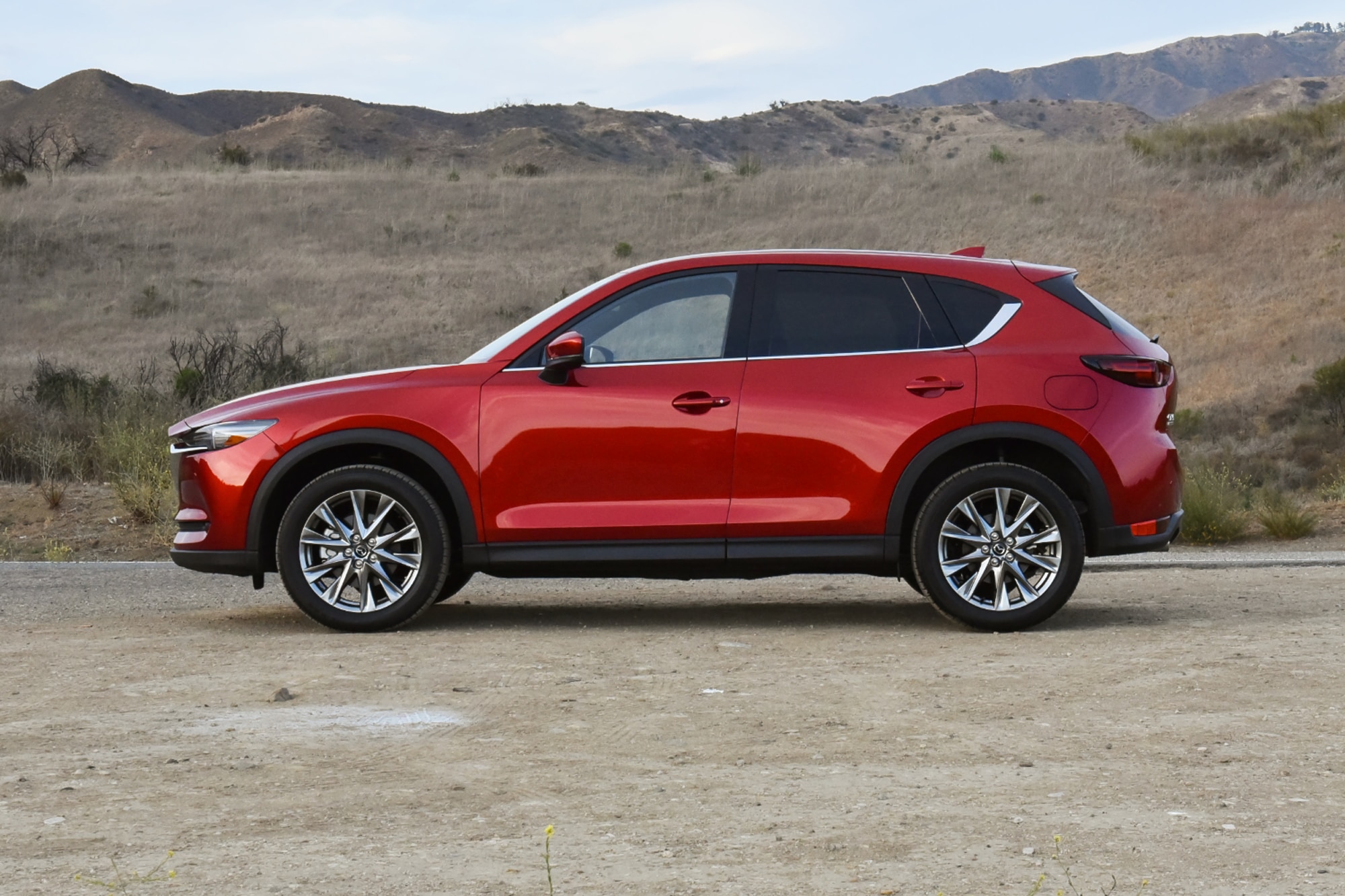 Christian Wardlaw
Christian Wardlaw
BIG STYLE IN A SMALL PACKAGE
Nearly a decade ago, the original CX-5 was the first production Mazda to wear the automaker’s now-familiar “Kodo: Soul of Motion” design language. This second-generation CX-5 evolved the design, sharpening the edges while adding more dramatic surfacing. As a result it looks stylish and premium, especially in one of the bold extra-cost paint colors.
This flair for design continues within where the CX-5 also boasts quality materials, subdued tones, and uniform textures. The Signature trim has a luxurious feel with exclusive Caturra Brown premium leather, real wood trim, a black headliner, and ambient cabin lighting. However, the leather is so strikingly dark that it loses some appeal.
Across the rest of the CX-5 lineup, upholstery choices include cloth, leatherette (simulated leather), and standard rather than premium leather. Heated front seats are standard with most trims, while the Grand Touring Reserve and Signature versions supply ventilated front seats, heated rear seats, and a heated steering wheel.
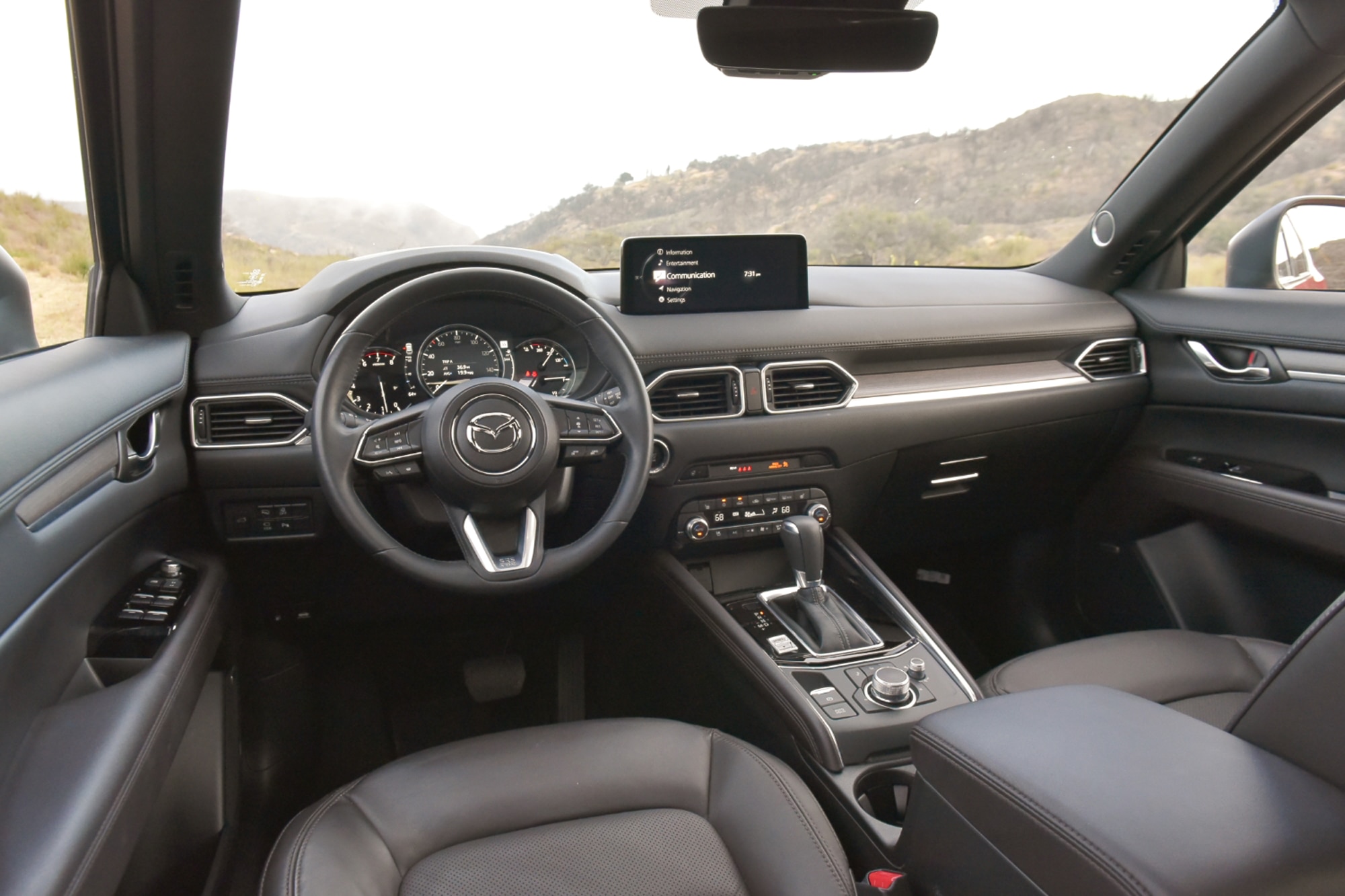 Christian Wardlaw
Christian Wardlaw
Front seat comfort is good, but larger people might find them a bit undersized. Likewise, tall people may have trouble with legroom. The rear seat is cramped for the compact crossover SUV class, and cargo space is underwhelming at 30.9 cu.-ft. behind the back seat and a maximum of 59.6 cu.-ft. Interior storage space is similarly stingy, so you may want to think twice about the CX-5 for its roomy accommodations or outright utility.
 Christian Wardlaw
Christian Wardlaw
Instrumentation is a model of simplicity and legibility, and the climate controls are separate from the infotainment system. Unfortunately, the Mazda Connect infotainment system does not offer touchscreen control. Instead, you must rely on the center console controls, steering wheel buttons, and relatively rigid voice command structures with a hit-and-miss success rate to operate it.
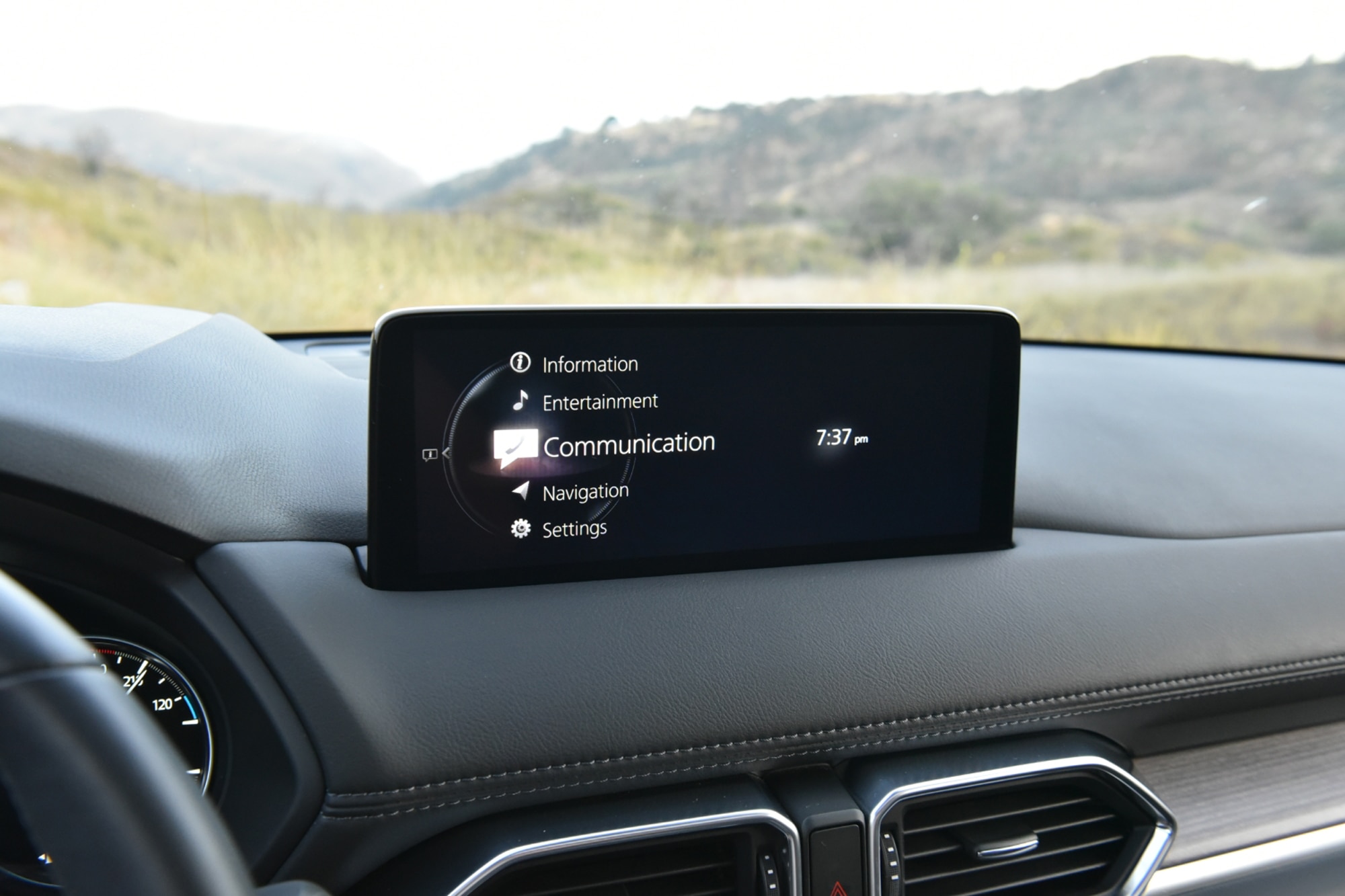 Christian Wardlaw
Christian Wardlaw
MAZDA UPDATES THE CX-5’S TECHNOLOGY FOR 2021
Though the CX-5 benefits from the latest Mazda Connect infotainment system, the technology is not as intuitive and straightforward to use as what you might find in competing vehicles.
Equipped with a new 10.25-inch widescreen display, the infotainment system includes improved graphics but does away with the previous version’s touchscreen operation when the vehicle is at a standstill. Mazda does not integrate touchscreens that may distract drivers, but this lack of functionality is a continuous inconvenience.
You must use the control knob and buttons on the center console, the steering wheel buttons, or voice commands to operate the system. This would work well if Mazda Connect offered natural voice recognition, similar to the latest technology from companies like BMW and Mercedes-Benz; but it doesn’t.
For example, Mazda Connect could not find the White House despite using the specific prompts required by the navigation system. It also did not change radio stations, adjust the interior temperature, or activate the seat heaters. Despite 2021 updates, the Mazda Connect’s voice recognition technology was a pain point in the test rides and could benefit from improvement to integrate various vehicle functions.
However, Mazda Connect offers a free three-year trial to Mazda Connected Services. They include automatic emergency calling, remote engine starting, a vehicle finder, and more. A Wi-Fi hotspot is available through an outside service provider, but you’ll get a complimentary three-month trial period for two gigabytes of data usage. A new MyMazda smartphone application is also a part of the package for Mazda Connected Services.
More expensive CX-5 trim levels offer satellite radio, navigation, and a 10-speaker premium sound system. The top-of-the-line Signature test vehicle had all of these features. Moreover, they worked well aside from the often convoluted process of accessing favorite radio stations and switching between them. It required too much twisting and pushing of the center console control knob for ease. It would be beneficial if Mazda would add a separate tuning knob with a station preset toggle function on the center console.
A head-up display is also available to project data onto the windshield, including:
Vehicle speed
Posted speed limit
Blind-spot warnings (found to be particularly helpful)
Lane departure warnings
Adaptive cruise control speed setting
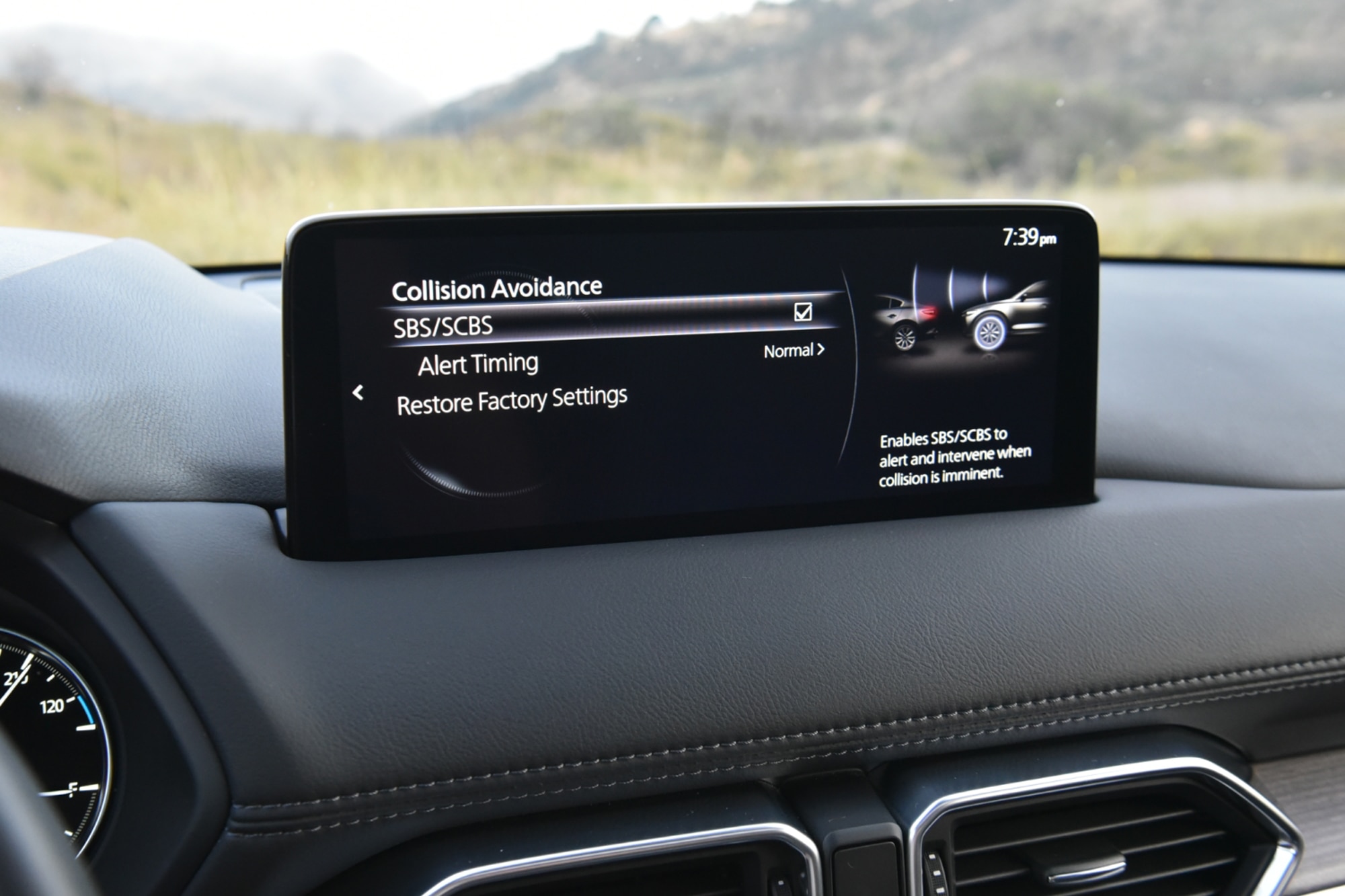 Christian Wardlaw
Christian Wardlaw
Speaking of driving aids, Mazda offers a comprehensive i-ActiveSense collection of Advanced Driving Assistance Systems (ADAS) as standard equipment on all 2021 CX-5 models. They include:
Adaptive cruise control with stop-and-go capability in traffic
Forward-collision warning
Pedestrian detection
Automatic emergency braking
Lane-departure warning
Lane-keeping assistance
Blind-spot warning
Rear cross-traffic warning
Automatic high-beam headlights.
Notably, rain-sensing wipers are also standard.
In more expensive trim levels, the 2021 Mazda CX-5 offers adaptive headlights that help the driver to see around dark corners, a windshield wiper de-icer, and a traffic sign recognition system. The CX-5 Signature includes all of these plus low-speed reverse automatic braking, a driver monitoring system, and a new-for-2021 high-definition version of the 360-degree surround-view camera.
Through Mazda Connect, owners can customize numerous aspects of the ADAS, including the types of warnings, sensitivity levels of the technology, and more. Unlike the voice recognition feature, the ADAS systems operate with smoothness and accuracy.
Based on Insurance Institute for Highway Safety (IIHS) evaluations, the CX-5 is a “Top Safety Pick+” crossover SUV, earning the highest scores possible from the organization. The National Highway Traffic Safety Administration (NHTSA) agrees, giving the CX-5 its top 5-star rating in all crash-test assessments, coupled with a 4-star rollover resistance rating.
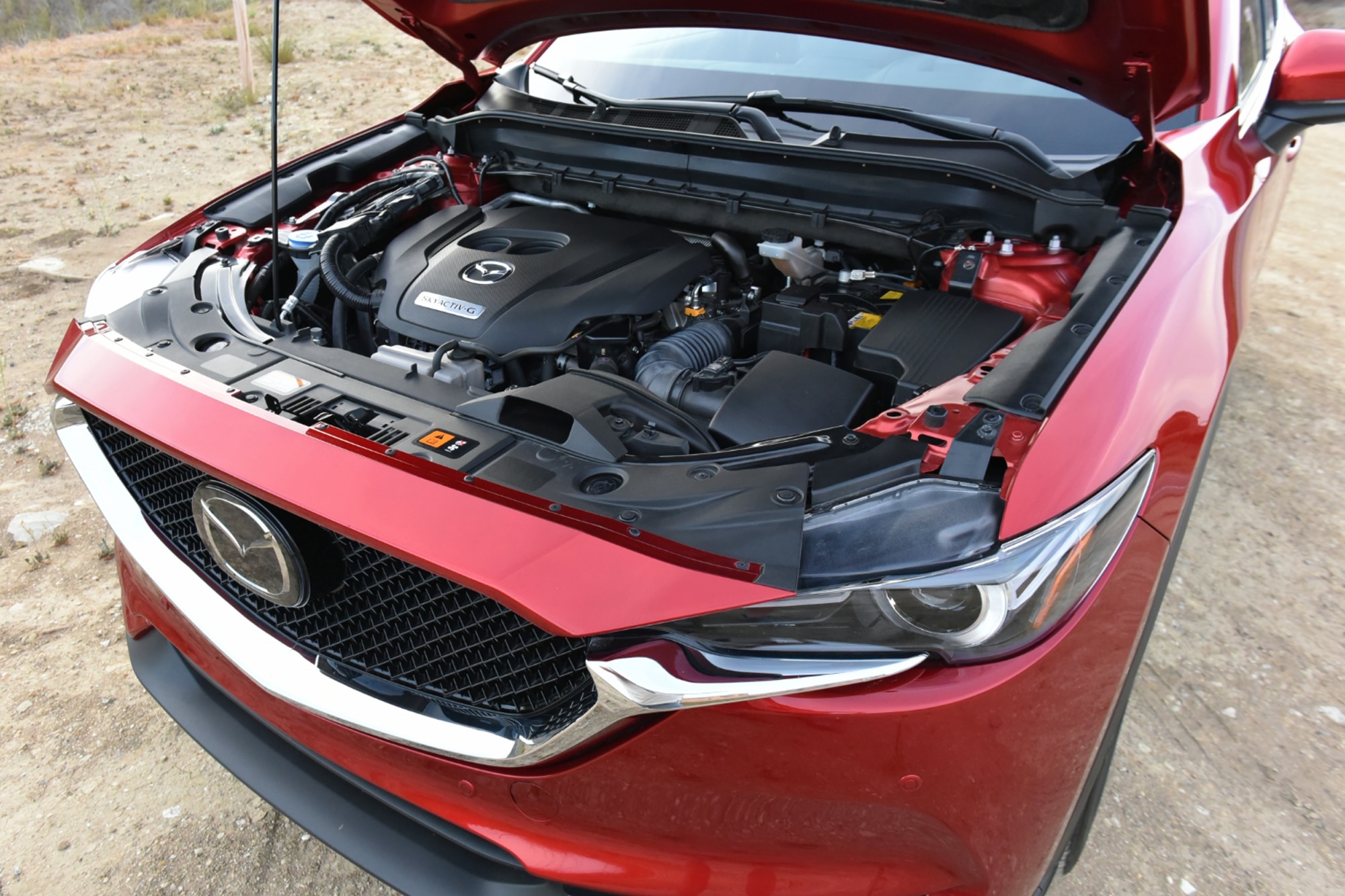 Christian Wardlaw
Christian Wardlaw
FUN TO DRIVE, DEPENDING ON THE SITUATION
Mazda offers two engine choices for the 2021 CX-5. In less expensive versions of the SUV, a 2.5L four-cylinder is standard. It makes 187 hp and 186 lb.-ft. of torque to compete in the segment.
More expensive versions of the CX-5 have a turbocharged version of the 2.5L four-cylinder producing up to 250 hp and 320 lb.-ft. of torque when burning premium (227 hp/310 lb.-ft. on regular). This engine makes the CX-5 among the quickest vehicles in its class while underscoring its premium positioning.
Both engines use a traditional 6-speed automatic transmission instead of a continuously variable transmission (CVT) or a dual-clutch automatic transmission (DCT). Front-wheel drive is standard with the base engine, with all-wheel drive (AWD) as an option. The AWD is standard with the turbocharged engine.
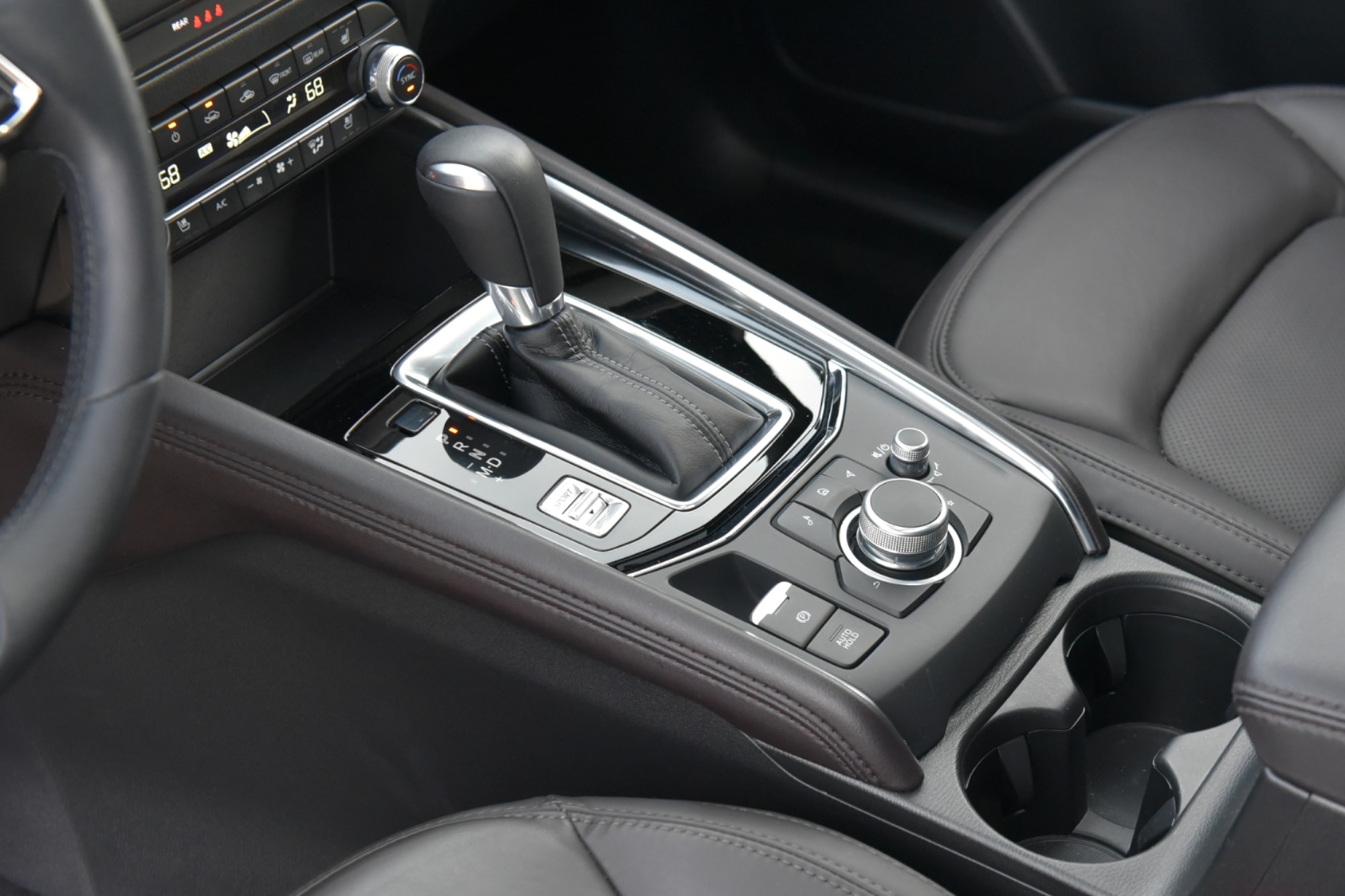 Christian Wardlaw
Christian Wardlaw
The Environmental Protection Agency (EPA) expects the Mazda CX-5 to return between 24 mpg and 28 mpg in combined driving, depending on the engine and drivetrain. However, during our evaluation the CX-5 Signature with the turbocharged engine and AWD averaged 21.2 mpg, falling short of its 24-mpg rating in combined driving.
Mazda underpins the CX-5 with a four-wheel-independent suspension and, depending on the trim level, either 17-inch or 19-inch aluminum wheels. In addition, the automaker’s proprietary G-Vectoring Control technology is a standard brake-based system designed to make the ride and handling in the CX-5 feel more responsive and natural to everyone in the crossover.
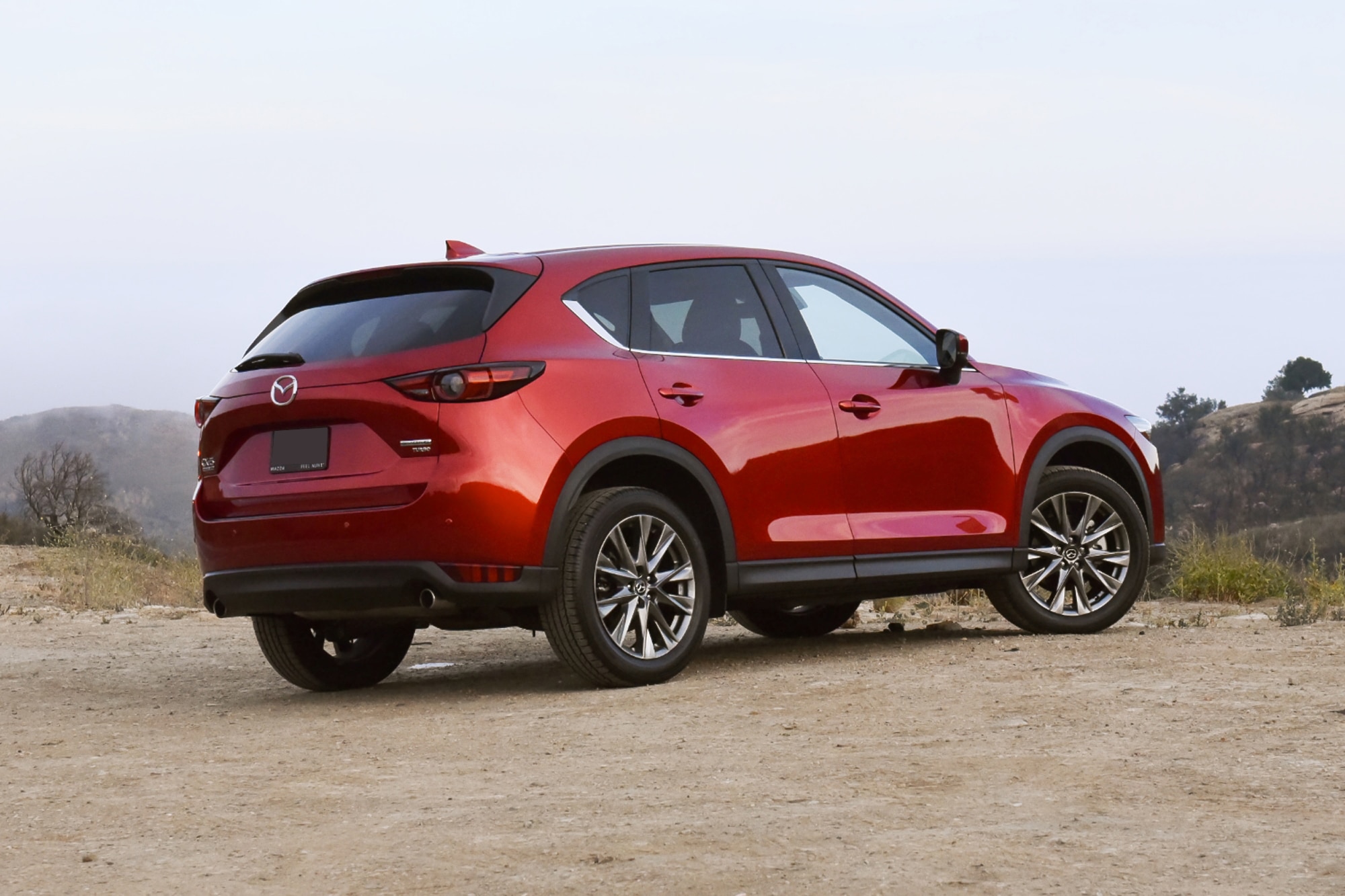 Christian Wardlaw
Christian Wardlaw
As is true for many Mazdas, the new CX-5 is entertaining to drive (especially with its turbocharged engine). However, when traveling on twisting, undulating pavement, the CX-5 fails to impress and drives like any other compact crossover SUV, bouncing about and rolling around on its suspension freely. If you’re seeking a vehicle with utility, AWD, and a thrilling driving character, you may want to consider the Mazda Mazda3 hatchback instead.
Granted, the Mazda3 doesn’t offer much in the way of off-roading capability; but the CX-5 supplies a mere two extra inches of ground clearance. Since it is a crossover and people might take it on a trail of moderate difficulty, Mazda does provide an off-road traction assist system for CX-5 models with AWD. This technology and driving talent can take the new CX-5 to places you might not expect, but it won’t be as easy as some rivals.
This SUV is best when driven in cities, around suburbs, and on the highways of America. In other words, you may enjoy driving the new Mazda CX-5 the most where you spend the majority of your time. In these environments it exudes refinement, feels agile, and shows athleticism. Getting up to speed is not a problem with the turbo. You can take corners and curves with enthusiasm. Plus, with AWD, you’re more likely to have an easier ride home when the snow starts flying.
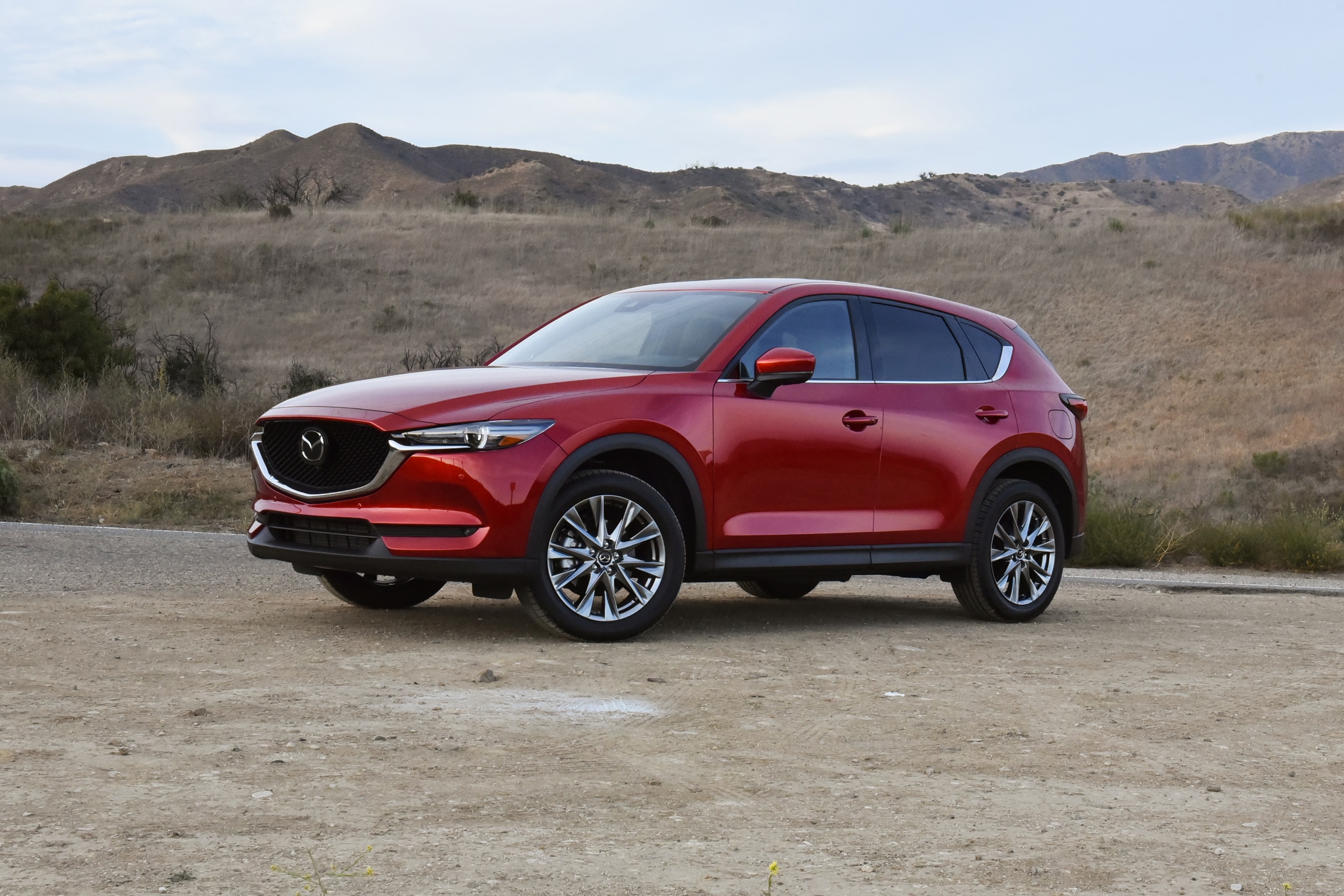 Christian Wardlaw
Christian Wardlaw
ACCEPTING THE CX-5’S SHORTCOMINGS IS KEY TO OWNER SATISFACTION
The 2021 Mazda CX-5 is small but mighty. It’s mighty stylish on the outside, mighty upscale on the inside, mighty powerful with its turbocharged engine, and national scores rate it as mighty safe in a collision. It serves Mazda’s purposes well as the automaker transitions to its new premium-positioned home.
As long as your deal breakers don’t include its size, lack of off-roading talent (compared to some alternatives in the class), and unavailable hybrid or plug-in hybrid options, the CX-5 is likely to satisfy.
Written by humans.
Edited by humans.
 Christian Wardlaw
Christian WardlawMy first word was “car.” That’s what I’m told, anyway. For as long as I can remember, I’ve been obsessed with them. The design. The engineering. The performance. And the purpose. I’m a car enthusiast who loves to drive, but I’m also most interested in the cars, trucks, and SUVs that people actually buy. Anybody can tell you that a sports car is fast. What you need to know is whether or not you should buy that new SUV, and why. My life purpose is to help you make that decision.
Related articles
View more related articles